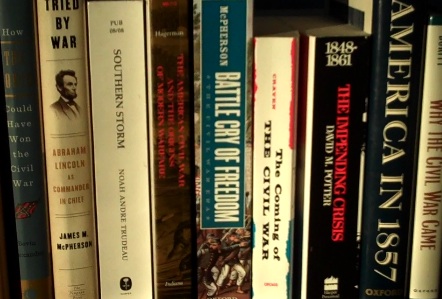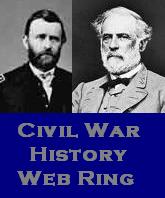A Slapdash War

A common theme among authors I have read this term who have written about the experiences of Civil War soldiers is the informality with which the war was conducted. Historian Bruce Canton called it
“slapdash.”
Now there’s a word we don’t use much today. I looked it up. Here’s Princeton’s take:
____________________________________________________________________________________
adjective – marked by great carelessness; “a most haphazard system of record keeping”; “slapdash work”; “slipshod spelling”; “sloppy workmanship” [syn: `haphazard]
adverb – in a careless or reckless manner; “the shelves were put up slapdash”
_____________________________________________________________________________________
It started with loose regimental recruitment methods. Drill and discipline were a far cry from today’s standards. Gerald Linderman, in his book Embattled Courage: The Experience of Combat in the American Civil War, spoke of the common practice of men within a community signing up together so pre-war relationships were undoubtedly difficult to set aside.  Catton supported this indicating that “in the average regiment of officers were people whom the enlisted men had known all their lives.” Election of officers by the men was a practice that continued long into the war and contributed to the problem. Even though recruits pledged to obey their officers, informality remained the rule. Catton’s quote of an Indiana soldier illustrates this point perfectly.
Catton supported this indicating that “in the average regiment of officers were people whom the enlisted men had known all their lives.” Election of officers by the men was a practice that continued long into the war and contributed to the problem. Even though recruits pledged to obey their officers, informality remained the rule. Catton’s quote of an Indiana soldier illustrates this point perfectly.
We had enlisted to put down the rebellion and had no patience with the red-tape tomfoolery of the regular service. Furthermore, the boys recognized no superiors, except in the line of legitimate duty. Shoulder straps waived, a private was ready at the drop of a hat to thrash his commander – a thing that occurred more than once.
“Regular army” officers shared frustration with this lack of regard for authority on both sides as it wasn’t unique to one army or the other. Catton noted astutely that men “could be led anywhere, but they could hardly be driven at all.”
A very fine lecture by Gerald Linderman covering more on this topic can be found here.
Copyright © 2007 Rene Tyree
W. Bruce Catton, America Goes to War: The Civil War and Its Meaning in American Culture, (Middleton, CT: Wesleyan University Press), 51.
Gerald E. Linderman, Embattled Courage: The Experiences of Combat in the American Civil War, (New York: The Free Press, 1987), 40.
slapdash. Dictionary.com. WordNet® 3.0. Princeton University. http://dictionary.reference.com/browse/slapdash(accessed: November 19, 2007).
Written by Rene Tyree
November 20, 2007 at 4:57 am
Posted in Books, Bruce Catton, Civil War, Gerald Linderman, Military History
Tagged with authority, Bruce Catton, Combat, Embattled Courage, Embattled Courage image, Gerald Linderman, Officers, recruitment, regular army, slapdash
4 Responses
Subscribe to comments with RSS.
















































Rene,
First of all, great job with the blog, I look forward to every visit.
When looking at the informality of how the war was conducted, especially initially, I think it’s very important to do so in context. Everything that you said in this entry is true. However, it’s the same way volunteer regiments had been raised for each conflict in the country’s history, most recently at that point during the war with Mexico. It was considered tradition and the right of volunteers to be this way, in their minds. For the regulars, as you mentioned, this was somewhat frustrating.
As the war progressed, everyting became much more formal and professional, of necessity. What you wrote did spark a question in my mind, though. The duration of the war caused a realization that things couldn’t be done so informally. I wonder how mobilizations for the Spanish-American War and WWI might have been different had the Civil War been the 90-day or six month war initially envisioned.
Keep up the good work.
Don
November 20, 2007 at 4:39 pm
[…] Chicken Guts Yesterday, Dimitri Rotov made my day by calling “the Union war effort” “jiggery-pokery.” This was in reference to my mention of Bruce Catton’s word for it…slapdash – in my post here. […]
Chicken Guts « wig-wags
November 22, 2007 at 6:26 pm
Don,
Thanks for your comments about the blog and the post. Your points are well taken. You mentioned that formality increased as the ACW went on – this out of necessity. My sense is that one of the reasons this became necessary was because of the reduction in “volunteers” and the introduction of conscription. It would be interesting to analyze the rate of executions for desertion from the start of the war to the finish.
Thanks again for dropping by.
Rene
Rene Tyree
November 23, 2007 at 3:00 pm
My father was a friend of Bruce Catton and both worked in the War Production Board during WW11 as writers. I have some very humorous letters to my dad from Mr. Catton. Does anyone know of a museum or perhaps Catton family members who might want this info?
L. Fitzgerald
October 13, 2008 at 6:56 pm